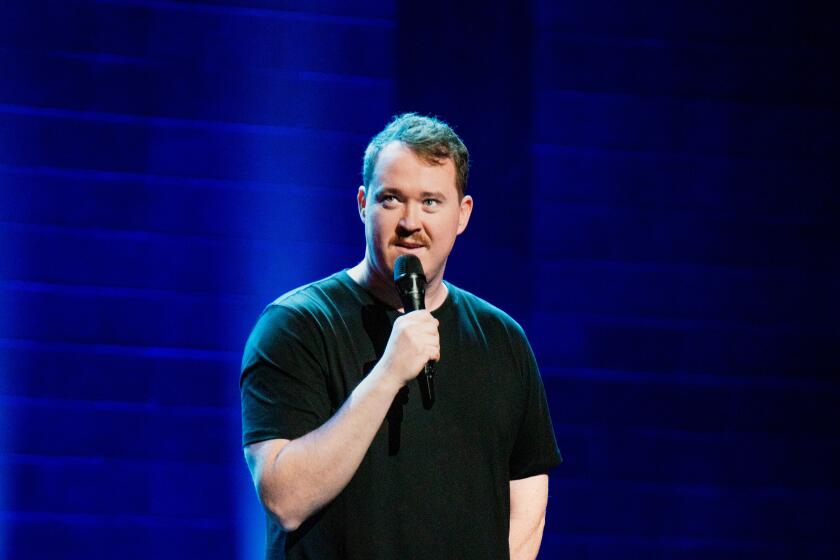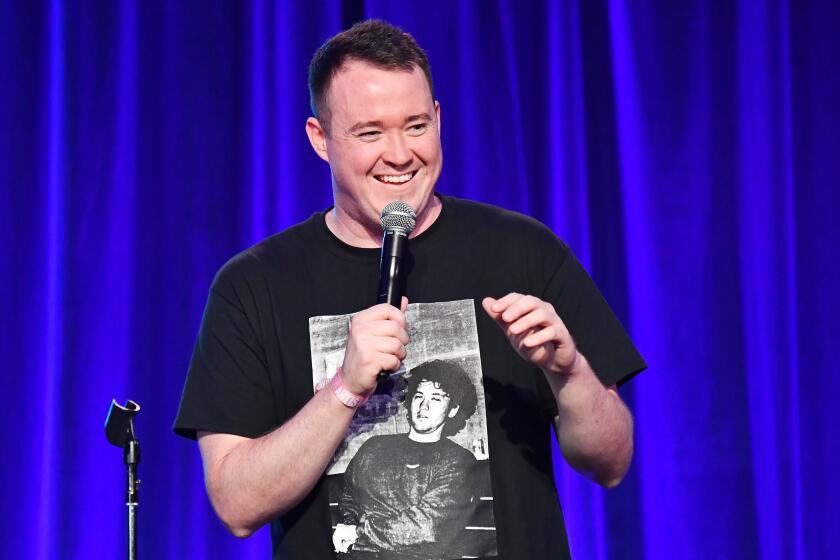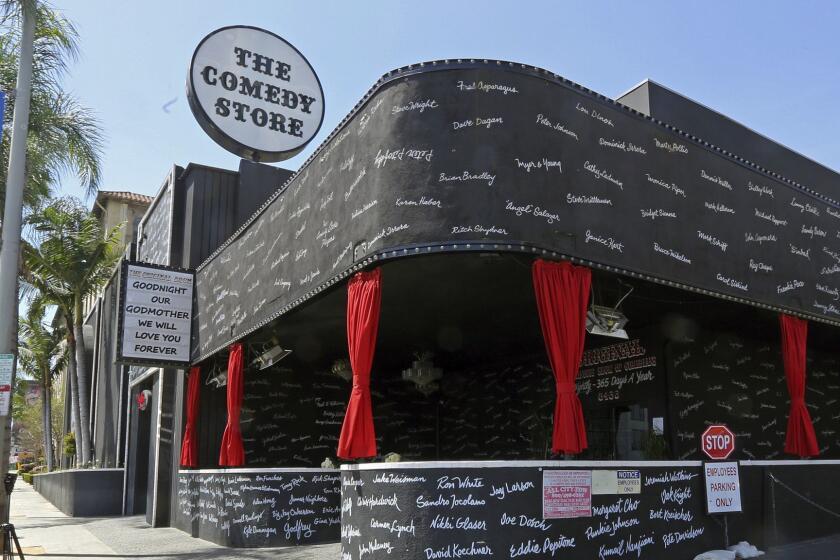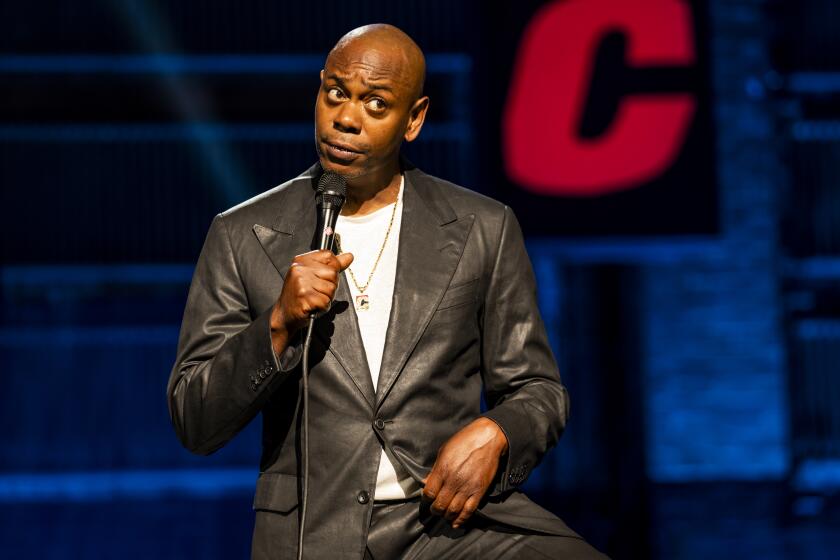Column: What exactly did ‘SNL’ prove by inviting Shane Gillis back as host?
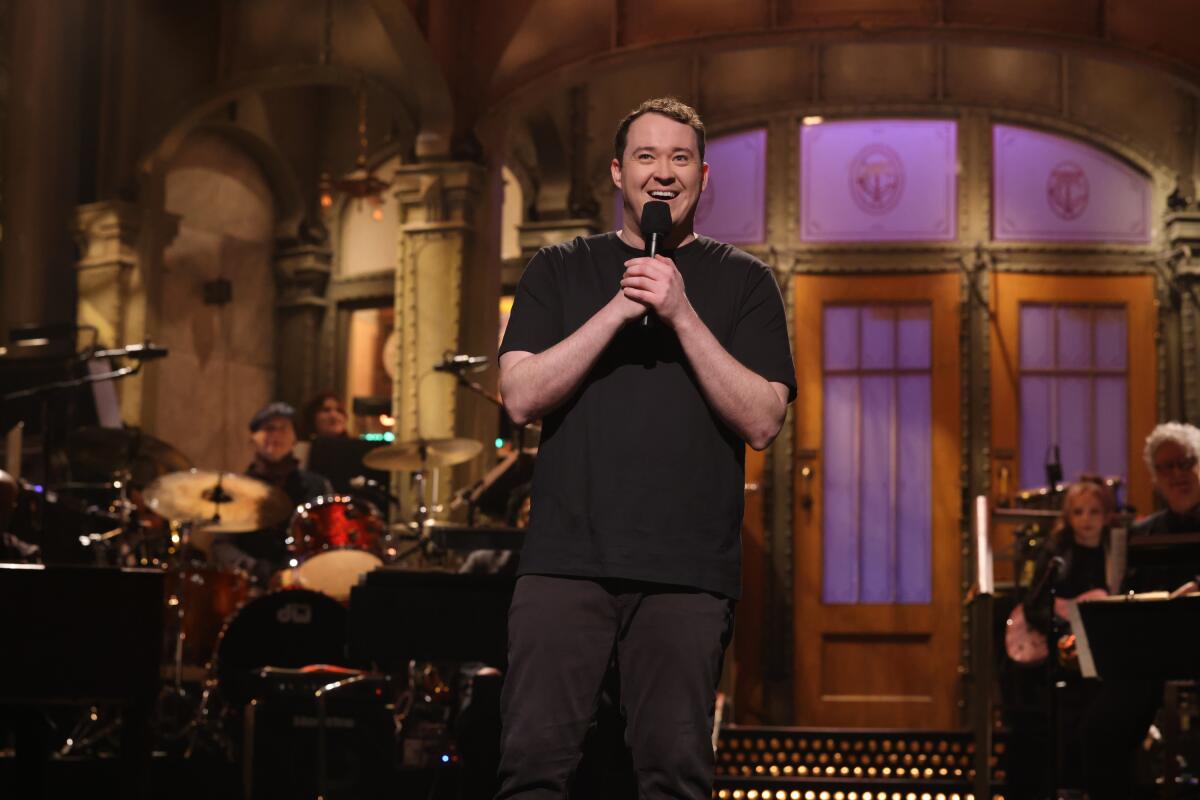
- Share via
Of course I tuned in to “Saturday Night Live.”
Who could resist the idea that comedian Shane Gillis, who was hired, then fired by the show in 2019 before ever getting a chance to appear on it, had been invited back in the plum role of host? Had he done something to redeem himself?
You may remember the story of his brief rise and fall at “SNL.” Shortly after he was announced as a new cast member, YouTube videos surfaced of Gillis making racist, sexist and homophobic jokes. One was a clip from a 2018 episode of “Matt and Shane’s Secret Podcast,” in which Gillis and his partner Matt McCusker trashed Chinese food, Chinese restaurants and Chinatowns in general, and used phony accents to discuss food like “nooders” (noodles). It was stupid, racist and painfully unfunny.
SNL creator and producer Lorne Michaels said he’d been unaware of the remarks and found them “offensive, hurtful and unacceptable.” Ironically, the story broke the same day that “SNL” announced it had hired its first openly gay Asian American comedian, the incredibly entertaining and versatile Bowen Yang. (The spectacular mimic Chloe Fineman was also a member of that year’s freshman class.)
Comedian Shane Gillis quickly addressed his firing in his monologue on ‘Saturday Night Live,’ and then proceeded to walk a comedic tightrope.
Anyway, far from Gillis’ being “canceled,” the 2019 tempest seems to have been an excellent, if unbidden, career move for the relatively unknown comic. Since then, he has repeatedly appeared on “The Joe Rogan Experience.” Last year, his Netflix stand-up special, “Beautiful Dogs,” was an unqualified success. He and McCusker have the No. 1 podcast on the subscription service Patreon. And on Monday, Netflix announced it had acquired his six-episode scripted comedy series, “Tires.”
What we have here is perfect entertainment industry logic: “SNL” fires Gillis, which raises his profile, which leads to greater success, which leads to Gillis being invited back to “SNL” as host. It’s a win-win.
By hosting “SNL,” Gillis gets to show that he’s not such a bad guy after all. And “SNL” can demonstrate that it’s not totally beholden to the left-wing sensibility that dominates the show. Was inviting Gillis back the comedy equivalent of adding viewpoint diversity? Or perhaps a way to stir up interest in a show with generally declining ratings?
Shane Gillis has been fired by “Saturday Night Live” just days after his hiring was announced. The show says its vetting process “was not up to our standard.”
Whatever motivated Michaels to bring Gillis back, my interest was piqued.
“Most of you probably have no idea who I am,” Gillis began. “If you don’t know who I am, please don’t Google that.”
He not only seemed humble for a podcast bro, he seemed incredibly ill at ease for a veteran of stand-up comedy. And he confessed as much. He was, he said, “just the most nervous I’ve ever been.”
So what did he riff about? His family, mostly. Seems tame, right? What could he possibly step in?
The Comedy Store’s “Potluck” open-mic night has a few ground rules: Buy two drinks, no heckling and absolutely no digital recording of any kind.
“My niece has Down syndrome,” he said, answering my question. The live audience was silent. “And I thought that would get a bigger laugh,” he said, as the crowd chuckled at his discomfort. “I thought we were allowed to have fun here.”
One of the minor joys of watching the “SNL” monologue is checking out the expressions of band members sitting behind the host. As Gillis spoke, they were stone-faced.
The rest of his bit about his family felt like the comedy equivalent of the white person’s defensive lament, “Some of my best friends are Black.”
Before his niece was born, said Gillis, his sister — who, he said, “didn’t know she could get pregnant” — fostered, then adopted “three Black kids.” Her husband — “an Arab guy” — is from Egypt.
“You go to the house, it’s like getting into the craziest Uber pool you’ve been in,” Gillis said. “It’s crazy. Like, ‘How did you guys meet?’ ”
What was supposed to be the high point of his monologue was an imaginary scenario in which his niece is called “retarded” by a white kid on the playground. “Then three Black kids come flying out of nowhere, start whaling on that cracker.”
Chappelle has painfully glaring blind spots when it comes to intersectionality. Yes, you can be Black and queer at the same time.
“I’m not saying it’s something I’m looking forward to,” he said, “but I think it will be a nice thing for the whole country.”
Some people found the bit funny, but if you deconstruct it, what you have is a comedian using a slur to explain why using a slur is bad, and then playing on white fears of young Black men as a punchline and wrapping it all up in another slur. “Yeah,” admitted Gillis, “I said ‘cracker.’ ”
Listen, policing comedy leaves a bad taste in my mouth. And offensiveness, like humor, is in the eye of the beholder. But punching down while pretending to punch up just isn’t that funny.
This is why I find Dave Chappelle’s routines about trans people so cringey. Turning people who are routinely subject to abuse and violence into the butt of jokes turns me off.
And yet, I also think Netflix was perfectly within its rights in 2021 to tell employees who walked out over Chappelle’s special “The Closer” that if they didn’t like the programming, “Netflix may not be the best place for you.”
I thought Gillis was pretty good in the episode’s sketches. But given his lackluster monologue, his appearance was essentially a gimmick that flopped. Redemption? Not really.
“I probably shouldn’t be up here, honestly,” said Gillis.
No quarrel there.
More to Read
A cure for the common opinion
Get thought-provoking perspectives with our weekly newsletter.
You may occasionally receive promotional content from the Los Angeles Times.

